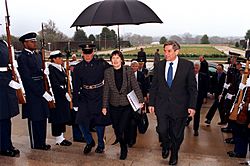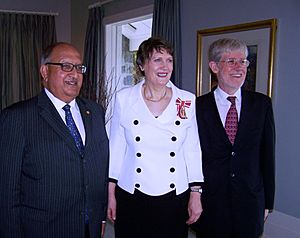Helen Clark facts for kids
Quick facts for kids
Helen Clark
|
|
|---|---|
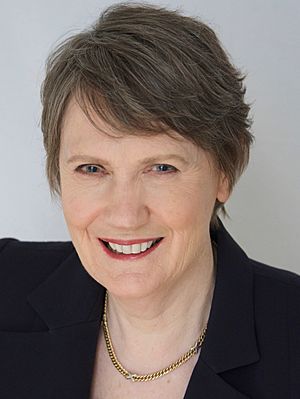
Clark in 2016
|
|
| 37th Prime Minister of New Zealand | |
| In office 10 December 1999 – 19 November 2008 |
|
| Monarch | Elizabeth II |
| Governor-General | Michael Hardie Boys Silvia Cartwright Anand Satyanand |
| Deputy | Jim Anderton Michael Cullen |
| Preceded by | Jenny Shipley |
| Succeeded by | John Key |
| 8th Administrator of the United Nations Development Programme |
|
| In office 17 April 2009 – 19 April 2017 |
|
| Secretary-General | Ban Ki-moon António Guterres |
| Preceded by | Kemal Derviş |
| Succeeded by | Achim Steiner |
| Minister of Foreign Affairs | |
| Acting 29 August 2008 – 19 November 2008 |
|
| Preceded by | Winston Peters |
| Succeeded by | Murray McCully |
| 27th Leader of the Opposition | |
| In office 1 December 1993 – 10 December 1999 |
|
| Prime Minister | Jim Bolger Jenny Shipley |
| Deputy | David Caygill Michael Cullen |
| Preceded by | Mike Moore |
| Succeeded by | Jenny Shipley |
| 12th Leader of the Labour Party | |
| In office 1 December 1993 – 11 November 2008 |
|
| Deputy | David Caygill Michael Cullen |
| Preceded by | Mike Moore |
| Succeeded by | Phil Goff |
| 11th Deputy Prime Minister of New Zealand | |
| In office 8 August 1989 – 2 November 1990 |
|
| Prime Minister | Geoffrey Palmer Mike Moore |
| Preceded by | Geoffrey Palmer |
| Succeeded by | Don McKinnon |
| 11th Deputy Leader of the Labour Party | |
| In office 8 August 1989 – 1 December 1993 |
|
| Leader | Geoffrey Palmer Mike Moore |
| Preceded by | Geoffrey Palmer |
| Succeeded by | David Caygill |
| 29th Minister of Health | |
| In office 30 January 1989 – 2 November 1990 |
|
| Prime Minister | David Lange Geoffrey Palmer Mike Moore |
| Preceded by | David Caygill |
| Succeeded by | Simon Upton |
| Member of the New Zealand Parliament for Mount Albert Owairaka (1996–1999) |
|
| In office 28 November 1981 – 17 April 2009 |
|
| Preceded by | Warren Freer |
| Succeeded by | David Shearer |
| Personal details | |
| Born |
Helen Elizabeth Clark
26 February 1950 Te Pahu, New Zealand |
| Political party | Labour |
| Spouse |
Peter Davis
(m. 1981) |
| Parents | George Clark Margaret McMurray |
| Alma mater | University of Auckland |
| Signature |  |
Helen Elizabeth Clark (born 26 February 1950) is a New Zealand politician. She was the 37th prime minister of New Zealand from 1999 to 2008. She was the second woman to become prime minister and the country's fifth-longest-serving leader.
After her time as prime minister, she worked for the United Nations. From 2009 to 2017, she was the Administrator of the United Nations Development Programme. This made her the first woman to lead this important organization.
Clark grew up on a farm near Hamilton. She studied politics at the University of Auckland and became active in the New Zealand Labour Party. After graduating, she taught political studies at the university. In 1981, she was elected to the Parliament for the Mount Albert area, which she represented for 28 years.
Before becoming prime minister, Clark held many important government jobs. She was the Minister of Health and the Deputy Prime Minister. In 1993, she became the leader of the Labour Party and the Leader of the Opposition.
After winning the 1999 election, Clark became prime minister. Her government, known as the Fifth Labour Government, started several major projects. These included Kiwibank, the New Zealand Superannuation Fund, and KiwiSaver. In world affairs, she sent troops to the war in Afghanistan but did not send combat troops to the Iraq War.
After three election wins, her government was defeated in 2008. Clark then resigned as Prime Minister and leader of the Labour Party. In 2019, she became the patron of The Helen Clark Foundation, an organization that researches public policy.
Contents
Early Life and Education
Helen Clark was the oldest of four daughters. She grew up on a farm in Te Pahu, near Hamilton. Her mother, Margaret, was a primary school teacher, and her father, George, was a farmer. She went to Epsom Girls' Grammar School in Auckland and then the University of Auckland.
At university, she studied politics and graduated with a Master of Arts degree in 1974. As a teenager, she became interested in politics. She protested against the Vietnam War and foreign military bases in New Zealand.
Clark joined the New Zealand Labour Party and was very active. She helped other Labour candidates and tried to get elected to the Auckland City Council herself, but was not successful. From 1973, she worked as a lecturer in political studies at the University of Auckland.
Member of Parliament
| New Zealand Parliament | ||||
| Years | Term | Electorate | List | Party |
| 1981–1984 | 40th | Mount Albert | Labour | |
| 1984–1987 | 41st | Mount Albert | Labour | |
| 1987–1990 | 42nd | Mount Albert | Labour | |
| 1990–1993 | 43rd | Mount Albert | Labour | |
| 1993–1996 | 44th | Mount Albert | Labour | |
| 1996–1999 | 45th | Owairaka | 1 | Labour |
| 1999–2002 | 46th | Mount Albert | 1 | Labour |
| 2002–2005 | 47th | Mount Albert | 1 | Labour |
| 2005–2008 | 48th | Mount Albert | 1 | Labour |
| 2008–2009 | 49th | Mount Albert | 1 | Labour |
In 1981, Clark was elected to the New Zealand House of Representatives. She represented the Mount Albert area in Auckland. She was the second woman ever elected to represent an Auckland electorate.
In her first speech in Parliament, she spoke strongly about defence and the arms race. She was concerned about the spread of nuclear weapons. During her first few years as a Member of Parliament (MP), she served on several committees, including those for Foreign Affairs and Disarmament.
Cabinet Minister
In 1987, Clark became a Cabinet minister in the Fourth Labour Government. She was the Minister of Conservation and the Minister of Housing. In 1989, she became the Minister of Health.
As Health Minister, she introduced the Smoke-free Environments Act 1990. This law limited smoking in places like workplaces and schools. She also became the Deputy Prime Minister in 1989.
Leader of the Opposition
After Labour lost the 1993 election, Clark became the leader of the party. This made her the Leader of the Opposition. She led the Labour Party against the National-led government for six years.
Labour did not win the 1996 election, but Clark remained as the party's leader. She was seen as a strong performer in the election debates.
During the 1998 Waitangi Day celebrations, Clark was part of a disagreement about speaking rights on the marae. The event was shown on national television.
Prime Minister (1999–2008)
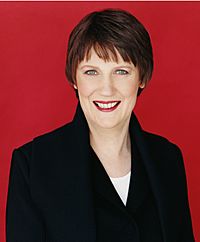 |
|
|
Premiership of Helen Clark
|
|
|---|---|
| 10 December 1999 – 19 November 2008 | |
| Elizabeth II | |
| Cabinet | Fifth Labour Government of New Zealand |
| Party | New Zealand Labour Party |
| Election | 1999, 2002, 2005 |
| Appointer | Michael Hardie Boys |
| Seat | Premier House |
|
← Jenny Shipley • John Key →
|
|
After the 1999 election, Labour formed a government with the Alliance party. Clark became New Zealand's second female Prime Minister. She was also the first woman to win the job in an election.
During her time as prime minister, many women held top jobs in New Zealand. For a time between 2005 and 2006, the Governor-General, Prime Minister, Speaker of the House, and Chief Justice were all women.
Clark's government was known for being stable. She worked well with different political parties to form governments. Her main interests were social policy and international affairs. She was a strong supporter of peace and making New Zealand an environmentally friendly nation.
Her government's key achievements include:
- The Working for Families package to help families with children.
- Increasing the minimum wage each year.
- Interest-free student loans.
- Creating District Health Boards.
- Introducing the NCEA for high schools.
In 2006, Forbes magazine named her the 20th most powerful woman in the world.
First Term: 1999–2002
Clark's first government was a coalition between Labour and the Alliance party, with support from the Green Party.
In 2000, a controversy arose over a painting. Clark had signed her name to a painting that was sold at a charity auction. The opposition party asked the police to investigate. The police found there was not enough reason to press charges.
In 2002, Clark apologized on behalf of New Zealand for how it had treated Samoa when it was a colony. The apology was made in Samoa on the 40th anniversary of its independence.
Later that year, Clark called an early election. This was because her coalition partner, the Alliance, had split over sending troops to the war in Afghanistan. In the election campaign, Clark was very popular with voters.
Second Term: 2002–2005
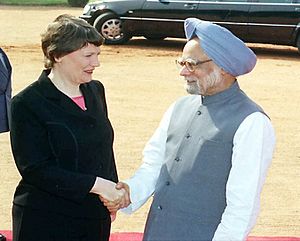
Labour won the 2002 election with more seats than before. Clark formed a new government with the Progressive Party.
Clark, who supports New Zealand becoming a republic, made some changes to build a stronger national identity. Her government created the Supreme Court of New Zealand to replace the Privy Council in London as the country's highest court. It also stopped giving out knighthood and damehood honours for a time.
In 2003, Clark's government opposed the Invasion of Iraq because it did not have the support of the United Nations. New Zealand did not send combat troops, but it did send some medical and engineering teams.
In 2004, Clark announced that New Zealand would start talks with China for a free-trade agreement. The agreement was signed in 2008. It was the first such deal that China signed with a developed country.
Third Term: 2005–2008
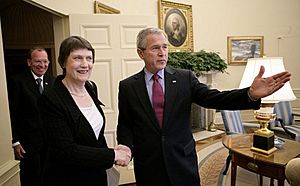
After the 2005 election, Clark became the first Labour leader to win three elections in a row. Labour formed a government with support from New Zealand First and United Future.
In 2006, Clark ordered New Zealand soldiers to be sent to East Timor to help with a crisis there. In 2007, she visited the United States and met with President George W. Bush. They agreed to work together on world affairs and trade.
By the end of her third term, Clark's government was facing challenges. The economy entered a recession, and some people felt her government was too controlling. This was sometimes called a "nanny state" approach.
In the 2008 election, the National Party, led by John Key, won the most seats. Clark admitted defeat and announced she would step down as leader of the Labour Party.
After Being Prime Minister
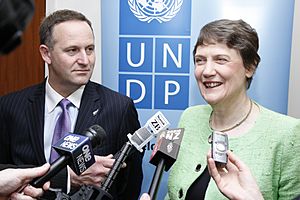
Clark did not stay in Parliament for long after the 2008 election. In April 2009, she resigned to take a top job at the United Nations.
United Nations Development Programme
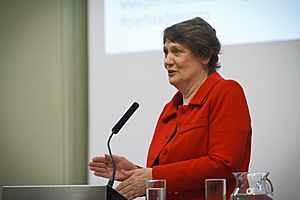
On 17 April 2009, Clark became the Administrator of the United Nations Development Programme (UNDP). She was the first woman to lead the organization. The UNDP works to end poverty and reduce inequality around the world.
During her time at the UNDP, she was known for her strong leadership. She worked to make the organization more open and efficient. Under her leadership, the UNDP was ranked as the most transparent aid organization in the world in 2015 and 2016.
She served two terms as Administrator and left the role on 19 April 2017.
Candidacy for UN Secretary-General
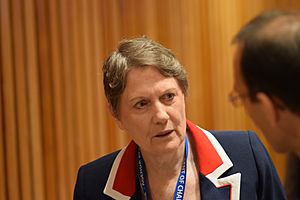
In 2016, Clark ran for the position of Secretary-General of the United Nations. The New Zealand government supported her campaign. She said she was running as the best person for the job, not just as a woman.
The selection process involved several rounds of secret voting by the United Nations Security Council. Clark did not win enough support to get the job. The position went to António Guterres of Portugal. A film about her campaign, My Year With Helen, was released in 2018.
Personal Life
Clark married sociologist Peter Davis in 1981. Davis is a professor who studies health and society.
Clark is a keen hiker and mountaineer. She enjoys spending time outdoors in New Zealand's mountains.
Since leaving the UN, Clark has remained active in global issues. She often speaks about topics like global health, climate change, and women's leadership. She is also the patron of The Helen Clark Foundation, a non-profit group that researches and discusses public issues in New Zealand.
Awards and Honours
- In 1990, Clark received the New Zealand 1990 Commemoration Medal.
- In 1993, she was awarded the New Zealand Suffrage Centennial Medal.
- In 2005, she was awarded the Star of the Solomon Islands for helping restore peace there.
- In 2008, she received the Champions of the Earth award from the United Nations for her work on sustainability.
- In 2010, she was appointed a Member of the Order of New Zealand, the country's highest honour.
- In 2017, she received a Lifetime Achievement Award at the New Zealand Women of Influence Awards.
- In 2017, she was awarded the Grand Cordon of the Order of the Rising Sun by Japan.
Images for kids
-
Clark wearing hijab in Tehran during a meeting with Iranian President Hassan Rouhani, 4 August 2013
-
Clark with Australian Prime Minister (and Labor Party leader) Kevin Rudd, 12 February 2010
See also
 In Spanish: Helen Clark para niños
In Spanish: Helen Clark para niños
- Electoral history of Helen Clark
- Politics of New Zealand
 | Anna J. Cooper |
 | Mary McLeod Bethune |
 | Lillie Mae Bradford |


